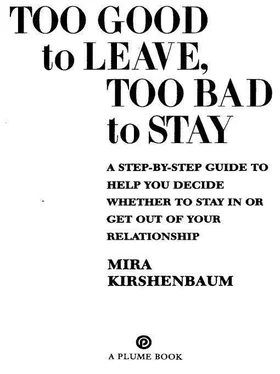Kirshenbaum, Mira - Too Good to Leave, Too Bad to Stay
Здесь есть возможность читать онлайн «Kirshenbaum, Mira - Too Good to Leave, Too Bad to Stay» весь текст электронной книги совершенно бесплатно (целиком полную версию без сокращений). В некоторых случаях можно слушать аудио, скачать через торрент в формате fb2 и присутствует краткое содержание. Жанр: Психология. Описание произведения, (предисловие) а так же отзывы посетителей доступны на портале библиотеки ЛибКат.
- Название:Too Good to Leave, Too Bad to Stay
- Автор:
- Жанр:
- Год:неизвестен
- ISBN:нет данных
- Рейтинг книги:3 / 5. Голосов: 1
-
Избранное:Добавить в избранное
- Отзывы:
-
Ваша оценка:
- 60
- 1
- 2
- 3
- 4
- 5
Too Good to Leave, Too Bad to Stay: краткое содержание, описание и аннотация
Предлагаем к чтению аннотацию, описание, краткое содержание или предисловие (зависит от того, что написал сам автор книги «Too Good to Leave, Too Bad to Stay»). Если вы не нашли необходимую информацию о книге — напишите в комментариях, мы постараемся отыскать её.
Too Good to Leave, Too Bad to Stay — читать онлайн бесплатно полную книгу (весь текст) целиком
Ниже представлен текст книги, разбитый по страницам. Система сохранения места последней прочитанной страницы, позволяет с удобством читать онлайн бесплатно книгу «Too Good to Leave, Too Bad to Stay», без необходимости каждый раз заново искать на чём Вы остановились. Поставьте закладку, и сможете в любой момент перейти на страницу, на которой закончили чтение.
Интервал:
Закладка:
So when someone crosses a line neither of you knew existed, it’s time for the “If this ever happens again ...” speech.
But a lot of people don’t deliver the speech correctly. The typical mistake you should avoid is “If you ever do this again, it’s all over.” It’s not that this isn’t true for you, but it sounds like a threat or a power move, and that’s apt to prevent your partner from seeing the truth about how you really feel.
What works is to say, “I really need to let you know that such and such is my absolute bottom line. That’s simply a fact for me, so if you ever do it again I’ll know you want to end our relationship.” That’s the point about bottom lines: you’re dealing with facts, not threats.
How to Be for Real
Some people who are badly caught in relationship ambivalence are terrified of bottom lines. I remember one man who’d spent over a decade telling everyone he knew about wanting to leave his relationship because his wife was “cold” and “mean.” But when he came to see me and I asked him if there was anything his wife could do that would signal that she’d gone too far and broken the bond between them—a bottom line—he said he wouldn’t want to specify anything like that because he didn’t want to be “too businesslike about love.”
When I pushed him a little and said that surely there had to be something that his wife could do or be that would signal to him that the relationship was over, he mentioned the very coldness and meanness he’d first complained about! She’d broken the deal, but it wasn’t a deal breaker! That leads to a riddle: When is a bottom line not a bottom line? Answer: When you’re married not to your partner but to your ambivalence.
That’s what this guy really wanted: to stay stuck in ambivalence. You remember I talked about mutual shutdown: where no one will give anything until the other gives something. The “benefit” of that is that you don’t have to do anything. Perfect for people who want to hold their ambivalence over their partner’s head and get things from their partner without giving anything back.
This guy wasn’t coming to me to get clarity. He was coming so that he could tell his wife he was dealing with his ambivalence so that she’d be scared into doing whatever he wanted because in fact she wanted to stay in the relationship.
Being married to your ambivalence is a lonely place to be, so I can’t believe you’d want to stay stuck in this place. That’s why you have to allow yourself to see your personal bottom lines when and where they exist and allow them to clarify the boundaries of what’s acceptable and unacceptable to you.
The Bottom Line About Bottom Lines. Let me sum up what’s important for you to know about bottom lines:
1. You’ve got to give yourself permission to have them, because otherwise you’re damaging and betraying yourself by going along with things that violate a bottom line that really exists.
2. You’ve got to discover what they actually are for you. You learn what your bottom lines really are through experience with what you feel about what happens to you in your life.
3. You’ve got to tell your partner what they are. But in doing so you can’t seem as though you’re threatening. It’s got to come across as a factual statement about what’s real for you.
4. You’ve got to follow through. A bottom line is a deal breaker, not an annoyance. You and your partner can struggle over something you find annoying until the day you die. That’s normal even in satisfying relationships. But since a bottom line means the end of the line, you’ve got to let your partner know that when he gets close to it. And you’ve got to act on it when he goes over it.
You don’t have to make anything a bottom line that really isn’t a bottom line for you. But if it is a bottom line and you don’t act on it when it’s crossed, you’re writing a prescription for misery. And that’s too bad because a bottom line is a prescription for happiness: it’s your way of saying, “I know what I need to be happy.”
Ultimately, having a bottom line is all about safety and freedom. Knowing how much is too much means you can always feel safe. Knowing where to draw the line means you’re always free to have the kind of life that meets your needs.
12
You Say “Tomayto,” I Say “Tomahto”
Issue: Differences Between You
Here’s a four-line history of many relationships:
• “I can’t believe how many things we have in common.”
• “Actually, in some ways we’re very different.”
• “We are really so different.”
• “We were just too different.”
If you talk to a lot of people after their divorce and ask them what happened, they’ll so often focus on differences that were too large or too difficult to live with. It’s even a point of divorce law: irreconcilable differences. Few people get to the point of wondering whether they should leave their relationship or not without having thought long and hard about ways they’re different from their partners.
DIFFERENCES THAT MAKE A DIFFERENCE
The issue of differences between two partners is unusually compelling as a way for people to understand what goes wrong in relationships. Whenever we meet anyone for the very first time, the first thing we’re aware of is the degree to which they’re similar to us or different from us. And if someone seems very different, that fact feels both striking and uncomfortable.
Whatever combination of similarities and differences brings two people together, once we’re in a relationship some differences have a way of magnifying themselves, the way a pebble in your shoe has a way of calling attention to itself all out of proportion to its size. And we’ve all had the experience of gaps or discordancies in relationships that are just too enormous for love to bridge.
Here are some differences people have brought to me as reasons their relationship might be too bad to stay in:
• Active/lazy. One can’t stand not getting things done; the other can’t stand doing things.
• Hotlcold. One partner is warmer, more passionate, more emotional; the other is cooler, more reserved, more intellectual-seeming.
• Optimist/pessimist. One is happier, more hopeful; the other is negative, gloomy, depressed.
• Fast/slow. One does things quickly; the other goes as slow as possible.
• Extrovert/introvert. One of you likes people, parties, popularity; the other likes staying home alone.
• Male/female. This separates people in most relationships but some people are exaggeratedly masculine or feminine or exaggeratedly aware of gender differences.
• Black/white. Actually, it doesn’t have to just be the black/white difference; any profound racial or ethnic difference can separate two people.
• Physical/sedentary. One likes to get a lot of exercise and do sports; the other just likes to sit around.
• Ambitious/pleasure bent. One wants to accomplish things; the other just wants to enjoy life.
• Thrifty/spendthrifty. One of you hates spending money; money seems to burn a hole in the other’s pocket.
• Smart/stupid. One partner is faster, brighter than the other and prefers using her head to solve problems. The other thinks his partner is arrogant and arbitrary.
• Left/right. One is a dedicated Democrat; the other is a rabid Republican.
• Aggressive/passive. One likes to make things happen; the other likes to wait for things to happen.
• Rich/poor. One either earns a lot or comes into the relationship with a lot of money; the other neither earns a lot nor has a lot.
Читать дальшеИнтервал:
Закладка:
Похожие книги на «Too Good to Leave, Too Bad to Stay»
Представляем Вашему вниманию похожие книги на «Too Good to Leave, Too Bad to Stay» списком для выбора. Мы отобрали схожую по названию и смыслу литературу в надежде предоставить читателям больше вариантов отыскать новые, интересные, ещё непрочитанные произведения.
Обсуждение, отзывы о книге «Too Good to Leave, Too Bad to Stay» и просто собственные мнения читателей. Оставьте ваши комментарии, напишите, что Вы думаете о произведении, его смысле или главных героях. Укажите что конкретно понравилось, а что нет, и почему Вы так считаете.












